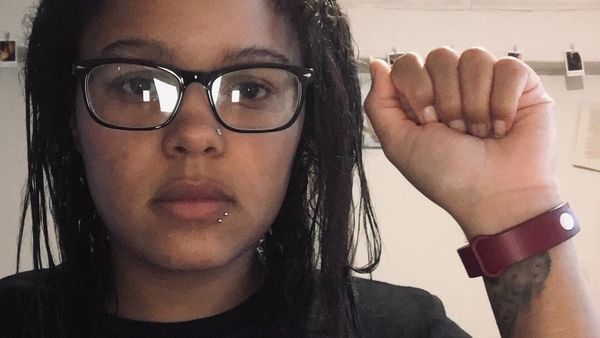Dear fellow white people,
This month is Black History Month and, from the resurgence of the "Oscars So White" hashtag to Beyonce's recently released video celebrating her blackness and shouting out to the activist group Black Lives Matter, there have been a lot of discussions in the last couple of weeks regarding race in the United States. Many of these discussions have come from the mouths of white people who think that racism isn't real, or that America is no longer racist, or even from people who are blatantly and unapologetically racist.
Many of these conversations, however have occurred within circles of well-meaning white people who consider themselves good people and really don't want to be racist. They know that racism is capital "B" bad, but talking about it makes them really uncomfortable and they end up behaving like this SNL skit:
So how can we avoid harming others and embarrassing ourselves through racism?
1) Education.
Education and understanding are the key to solving problems. In this case, a good place to begin is to learn about racism, privilege, and oppression. Franchesca Ramsey, YouTube star and contributor and writer for The Nightly Show is excellent at explaining these issues.
I also highly recommend her video explaining privilege. Understanding privilege and oppression and the ways that those things intersect is an important part of learning how to confront and deconstruct our own internalized racism and biases.
2) Listen.
As a white person, it is important to listen to people of color when it comes to conversations regarding race. They live it. They're the experts. No matter what philosophical spin you put on it, racism is a real and serious problem in the US today, and no one knows that better than POC. Furthermore, the anti-racist movement is by and for people of color. This means that when it comes to topics of racism, the job of white people is to listen. It is not the job of white people to derail conversations about racism to make them center white people. It is our job educate ourselves on our own time, listen to and support POC when we have the opportunity, and talk about racism with other white people so that we can support each other as we learn and call each other out when we make mistakes.
If a person of color is criticizing you for racist behavior, listen to what they have to say. To put it into perspective, (to use the example Franchesca uses in her video above) if you step on someone's foot on accident, and they say "Ow! That hurt me." You shouldn't be defensive or tell them that it's their own fault. You should recognize your blunder, apologize, and take measures to be more careful in the future.
3) Chill out.
Try to take it easy when discussing race. Racism is an emotionally charged topic for totally valid reasons, but we can still talk about it with a level head and respect for one another. Side note: It is not your job to tell a person of color to chill out about race. They have the right to be angry. Telling them how they should express and fight against racism is called "tone policing," and it is one of many ways that white supremacy is held intact.
If you find yourself getting defensive in general during discussions of race, explore why you feel that way. Do you feel guilty? "White guilt" is a common side effect during the process of confronting internalized racism, but your negative feelings are something you should process on your own time. The effects of racism on People of Color, which can be and often are fatal, are more important than white guilt, so don't expect POC to sympathize with you about it, and don't try to derail conversations about the anti-racist movement to focus on it. Grab mimosas with other white people who are also confronting their internalized racism and process it together, or journal, or do something else that doesn't prioritize white feelings over black lives.
Remember friends, it isn't our fault that racism exists, but as people who benefit from it as a system which privileges us, it is our responsibility to confront the racism in ourselves if we really want to achieve racial justice in our communities, and the things I've listed above are only the first steps. It won't be easy, but it's better than complicitly supporting a system of oppression.
So start now. Read up on Malcolm X, bell hooks, and Marsha P. Johnson. Learn the definitions of words like intersectionality and microagression. But don't stop there. Pay attention to your own thoughts and biases and confront them. Take responsibility for your mistakes. Don't give up.





















